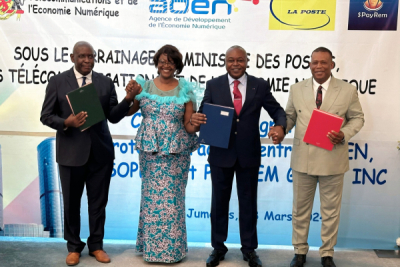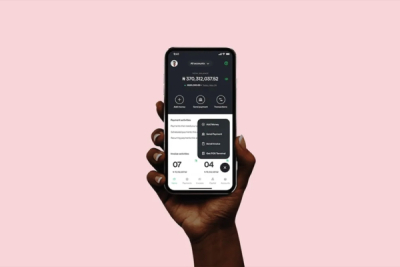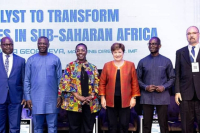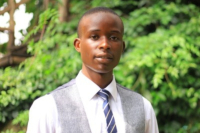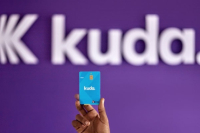The solution was developed to help people get the best prices in online shops.
ComparoShop, a digital solution developed by a startup based in Douala, Cameroon, allows users to compare prices of a wide array of items online before making purchases from online stores. The startup, founded by Didier Tagne in 2022, employs artificial intelligence to enhance search results.
The platform, which does not offer a mobile application, can be accessed via a browser. Users are not required to create an account to access the platform’s information. By entering the product name in the search bar, users can view various suggestions. Based on their geographical location, they can find online stores selling the desired item, its prices, and customer reviews of the respective store. This enables users to compare prices, analyze reviews, and make informed decisions.
Purchases are made through the online stores linked to ComparoShop. Users select their preferred offer on ComparoShop and are redirected to an external site to complete the purchase by clicking on the “See offer” button. If the online store only has a social media page instead of a website, ComparoShop notifies the store to contact the user for delivery. Currently, the startup operates only in Cameroon and Algeria.
Adoni Conrad Quenum
As the tech landscape continues to evolve, entrepreneurship in new technologies is gaining prominence. Cyberschool Entrepreneuriat, based in Gabon, is positioning itself as a key player, spurring the youth to tap into the potential of Information and Communication Technologies (ICTs).
Cyberschool Entrepreneuriat, a Gabon-based incubator specializing in new information and communication technologies (NICTs), leverages these technologies to foster entrepreneurship and aid young individuals in bringing their projects to fruition. The incubator, established in 2010 by Mve Asseko Simplice, an IT project management master’s degree holder, runs several training and support programs to cultivate an entrepreneurial mindset among Gabon’s youth.
The incubator has initiated a two-week training seminar for project leaders and those seeking to enhance their skills, focusing on business plan creation. To further assist its entrepreneurs, Cyberschool Entrepreneuriat has developed Business Booster, an application designed for business plan creation and project monitoring.
It regularly hosts a digital lunch for IT professionals and organizes development workshops. These workshops offer training in computer programming, software development, and IT project management to young individuals and professionals. The workshops aim to equip participants with the necessary tools to stay abreast of the latest technologies and trends, preparing them to work in teams and tackle the challenges of the IT industry.
Additionally, Cyberschool Entrepreneuriat offers training in graphic design and visual communication. This course enables students to master graphic design tools and software, principles of visual composition, and typography. It equips them with robust technical skills for producing high-quality visual communication media, creating effective graphic designs tailored to customer needs, and fostering the creativity and artistic flair required to design innovative and original projects.
Melchior Koba
In a bid to diversify its revenue streams and modernize its economy, Congo, like many of its African counterparts, is turning to digital technology. The country is banking on collaborations with seasoned partners in the digital arena to yield positive outcomes in the near future.
U.S.-based Pay Rem Group Inc, a firm focused on modernizing financial services, is set to launch several digital initiatives in the Congo in the upcoming months, in collaboration with the government. A memorandum of understanding was inked on March 18 between the company, Congo’s Digital Economy Development Agency (ADEN), and the Congo Post and Savings Company (Sopeco), aiming to foster digital inclusion and bridge the digital gap in the country.
Héliodore Francis Alex Gouloubi, Managing Director of ADEN, outlined the agreement’s purpose, stating it would facilitate “the execution of a structuring project aimed at enhancing the digital start-up ecosystem through their participation in the operation of certain financial products designed to increase banking penetration.”
The initial phase of the three-way partnership will see the roll-out of several projects in Congo, including setting up a digital bank and a production unit for digital products. The partnership will also ensure the provision of broadband internet services in the country’s remote areas.
This agreement aligns with the Congolese government’s digitization efforts across all key sectors, with a particular emphasis on the financial sector. The modernization of these sectors and the growth of the digital economy represent the fifth pillar of the National Development Plan 2022-2026.
The implementation of projects under this agreement should help to revitalize and reinvent Sopeco, reduce the digital divide, develop financial inclusion for the population, and create jobs, among other things. The aim is to create 3,000 to 4,000 jobs in the first phase of the project and 20,000 in three years.
Samira Njoya
Nigerian neobank Brass has raised an undisclosed amount of funding to support its operations, Techcabal reported on Tuesday. The startup recently faced disruptions following a partner withdrawal but has now processed pending transactions. Brass plans to use the new funding to accelerate growth within the Nigerian market.
Start-up funding declined in 2023, yet the foodtech sector remains attractive due to innovation potential. In that context, a global competition has been launched to boost startups active in the sector.
Swiss flavor and taste specialist Givaudan and the FoodHack foodtech community announced on March 19 that applications for the foodtech world cup are open until April 11.
The competition aims to leverage local networks to highlight 60 foodtech founders from North America, Latin America, sub-Saharan Africa, Asia-Pacific, Europe, North Africa, and the Middle East on a global stage to boost their growth.
“We hope to discover groundbreaking solutions created by exceptional and entrepreneurial founders that have a tangible impact on a healthier and more sustainable future for all,” said Alexandre Bastos, Head of Open Innovation and Venture Capital at Givaudan, about the partnership with FoodHack and HackSummit.
After their pitch presentations, two solutions from each region will be selected to participate in the competition’s final in Lausanne, Switzerland.
Adoni Conrad Quenum
A serial entrepreneur, she is mainly active in the digital and telecommunications sectors. Her latest innovation is an online platform designed to streamline hotel check-ins.
Franco-Gabonese finance expert and entrepreneur Selena Souah is the founder and CEO of REGCARD, a startup that launched its digital check-in card for express online hotel check-ins worldwide in 2022. The platform, which operates like a travel diary, allows hotels to perform express check-ins and check-outs for their guests at no cost and has a database of over 19,900 travellers.
Souah is also a co-founder and head of business development at International Schools Engineering, a management, investment, and consultancy group in the education sector established in 2013. In 2015, she co-founded Odyssey Education, a global French international education group offering education from nursery to sixth form.
In addition, Souah founded and presides Revolution’Air, a Rwanda-based telecommunications operator and internet service provider established in 2018. The company aims to establish a truly pan-African network and address connectivity and access issues in rural areas. Since January 2024, Souah has been a board member of Institut Aspen France.
Souah, a graduate of Maisons d’éducation de la Légion d’honneur in France, earned a bachelor’s degree in commerce and international business in 2008 and a master’s degree in general finance from ISC Paris in 2012. She began her professional career as a credit analyst at BGFIBank Gabon in 2011 before joining the French branch of Portuguese banking institution Banco Espírito Santo in 2012.
Melchior Koba
Artificial intelligence (AI) is rapidly emerging as a key technology of the fourth industrial revolution. While offering significant opportunities, AI also presents potential risks that require proactive mitigation.
Kristalina Georgieva, the Managing Director of the International Monetary Fund (IMF), has called on African nations to fully embrace artificial intelligence (AI). She made these remarks at a conference in Accra, Ghana, on March 18, 2023, co-hosted by the IMF and the Ghanaian Ministries of Finance, Communications and Digitisation.
"Artificial Intelligence is our best chance to overcome the long-term low productivity. When we think of what can lift productivity, by far, our best chance is in investing in green transition and in the adoption of AI. It (AI) can be the big bang that allows us to live longer, healthier, better educated, [and] more productive lives. We face, urgently, the necessity to embrace AI, and make the best out of it," she said.
The advent of generative AI, such as ChatGPT in November 2022, has raised public awareness of both the advantages and potential risks of this technology. Several African countries have implemented national AI strategies and are taking steps to regulate its widespread use. Seydina Moussa Ndiaye, a member of the United Nations’ 38-strong AI advisory body, expressed concern that Africa could become a testing ground for new AI solutions without adequate control over the technology.
According to Ghana’s Finance Minister, Mohammed Amin Adam, AI could potentially generate nearly $1,200 billion for the African continent by 2030. However, as Georgieva noted, achieving this goal requires building more digital infrastructure, investing in human capital, fostering entrepreneurial innovation, and establishing a robust regulatory framework.
Adoni Conrad Quenum
Africa's rapid technological growth underscores the need to educate young people about online risks and promote safe internet use. Organizations are working to provide safe access to digital opportunities for African youth.
The Women, Gender, and Youth Directorate (WGYD) of the African Union Commission and TikTok, the popular short video sharing app, have recently entered into a partnership. The collaboration aims to promote digital safety on the internet through the “SaferTogether” campaign, targeting teenagers, teachers, and parents.
As part of this initiative, educational videos on online safety, along with content creator recommendations, will be published on TikTok. Additionally, TikTok and the African Union Commission will distribute digital safety toolkits to assist teachers and tutors in addressing key digital safety issues. These resources will be available on a dedicated microsite on TikTok, serving as an interactive guide for safer online practices.
This campaign is a component of the African Union’s Digital Transformation Strategy for Africa and its “1 Million Next Level” initiative. The goal is to enhance young people’s access to digital platforms and promote their safe use to mitigate internet-related risks.
The partnership is expected to equip young people with the necessary tools and confidence for safe internet surfing, fostering a more inclusive and safer online community for young Africans. Nonkululeko Ngwenya, Head of the African Union’s WGYD, stated, “While access to internet can help children and young people stay connected, improve their digital literacy, and diversify their livelihoods, it is crucial that they are provided with a safe environment to reap the benefits of digital platforms.”
Samira Njoya
The tech entrepreneur specialized in education founded Nyereka Tech to provide innovative educational tools for African students and teachers. The company aims to play a significant role in the continent's educational and technological advancement.
Rwandan tech entrepreneur Shadrach Highflyer (photo) is the founder and CEO of Nyereka Tech, a startup that supplies experimental kits. Established in 2019, Nyereka Tech focuses on education and technology, specializing in the development and supply of innovative educational tools like IoT kits, STEM hardware, and robotics equipment.
The company offers a range of training services in areas such as IoT or microcontroller coding, circuit design, testing, electricity, electronics, software design, and robotics. These services are available to individuals, schools, companies, and centres.
"Nyereka Tech is a company founded on the purpose of resolving the pain points that our future and current innovators are experiencing. We’re collaborating with some of the top technology businesses on the planet to deliver the latest goods and ideas to more people all around the world in order to establish the ICT Innovation Journey. We’re constructing the company that will serve as the continent’s innovation hub," Highflyer explains.
Since 2022, the tech entrepreneur has been a mentor at The Cortex Hub, a British incubator for ICT companies in Rwanda. He also serves as an ambassador for Arm, a company that specialises in the construction of IP solutions.
Highflyer, a holder of two degrees in electrical and electronic engineering from Tumba College of Technology (2017) and the Institute of Information Science and Technology in Kobe, Japan (2019), served as a business mentor for the OIP Mentoring Program in August 2022, a program that supports young entrepreneurs in developing their startups.
Melchior Koba
Nigerian financial technology startup Kuda has secured operating licenses in Tanzania and Canada, tech news platform Techcabal reported on Monday. These licenses will allow Kuda to offer money transfer and multi-currency wallet services to users in these new markets.
More...
Zone, a Nigerian fintech company specializing in blockchain-based payment processing, announced the completion of an $8.5 million funding round on Monday.
"With the support of our new investors, we will enhance our technology, launch new use-cases and expand our network coverage. We will also complete preparations to conduct a comprehensive pilot program to test our cross-border capabilities in 2025. This will further solidify our position as a pioneer in decentralized payment infrastructure for Africa," the startup said.
Gabon's transitional government has revitalized the country's information and communication technology (ICT) sector. The move includes relaunching stalled projects, signaling a new dynamic in the sector.
Gabon is set to revive the construction of a cybercity on Mandji Island, aimed at becoming a hub for the country’s digital economy. On March 13, a delegation led by Bonjean Frédérik Mbanza, Minister for the Digital Economy, and an investor from Korean holding company M.K. International Inc., visited the site.
The project, first announced in 2012 by the previous government, plans to consolidate eight technology parks into one location. These include Gabon Internet City (GIC), Gabon Hosting Zone (GHZ), Gabon Outsourcing Zone (GOZ), Gabon Media City (GMC), Gabon Studio City (GSC), and Gabon Tech Zone (GTZ).
The GIC is expected to be an attractive platform for global ICT firms, fostering the growth of e-commerce and teleservices. Companies such as Google, Microsoft, Cisco Systems, IBM, HP, Dell, Siemens, Sony Ericsson, Telemedicine.com, RAFT, and Resintel are expected to establish their presence there.
The revival of the cybercity aligns with the transitional government’s objectives of economic development through digital and technological innovation, providing a conducive environment for start-ups.
In January, the government secured a $68.5 million loan agreement with the World Bank for various digital initiatives. These include the provision of online public services, the introduction of a unified identity system for all citizens, and the construction of a data center.
Samira Njoya
After her studies and several years working as a software engineer in the United States, she returned to Kenya to help her community by establishing an education organization to help children learn about technology.
Nelly Cheboi (photo), a Kenyan computer scientist and entrepreneur, co-founded TechLit Africa, a non-profit organization aimed at promoting technological literacy in Africa. The organization, established in 2018, provides basic computer skills education to Kenyan students aged 5 to 14.
“Digital skills provide global opportunities,” Cheboi said in 2023. “These kids are doing so much. They have Zoom calls with NASA. They are so open to the world.”
TechLit Africa facilitates the establishment of computer labs in African schools by distributing recycled and refurbished computers. It currently serves 4,000 students across 10 computer labs and plans to construct an additional 100 labs to accommodate 40,000 more students.
After earning her Bachelor’s degree in Computer Science and Applied Mathematics from Augustana College in the U.S. in 2016, Cheboi joined New World Van Lines, a U.S.-based domestic and international household goods removal company. She held various positions, including business analyst and software engineer, between 2016 and 2018.
She later took on multiple software engineering roles at companies such as logistics firm ShipBob, children’s coding program Kodable, and User Hero, a tech company that assists businesses in conducting and organizing user research.
Cheboi’s contributions through TechLit Africa have earned her several accolades. In 2021, she received the Richard Swanson Humanitarian Award from Augustana College and was named in the Forbes 30 under 30 list for her social impact. In 2022, she was honored with the CNN Hero Award.
Melchior Koba
Egyptian healthtech firm 30Med, which seeks to connect pharmaceutical companies and doctors by simplifying the introduction of new drugs through iterative videos, announced last week that it has successfully closed an undisclosed funding round.
The company plans to use the funds to enhance its platform and expand its presence in the medical community.




